
New construction homes are tailor-made abodes built from the ground up, defined by modernity and pristine condition. If you are considering buying a home that no one else has lived in before, this article breaks down the essentials: the benefits of newly built properties, the diverse options available, and crucial factors like costs and timelines. Our aim is for you to have a clear roadmap, without the excess jargon, to help you understand what new construction entails for prospective homeowners.
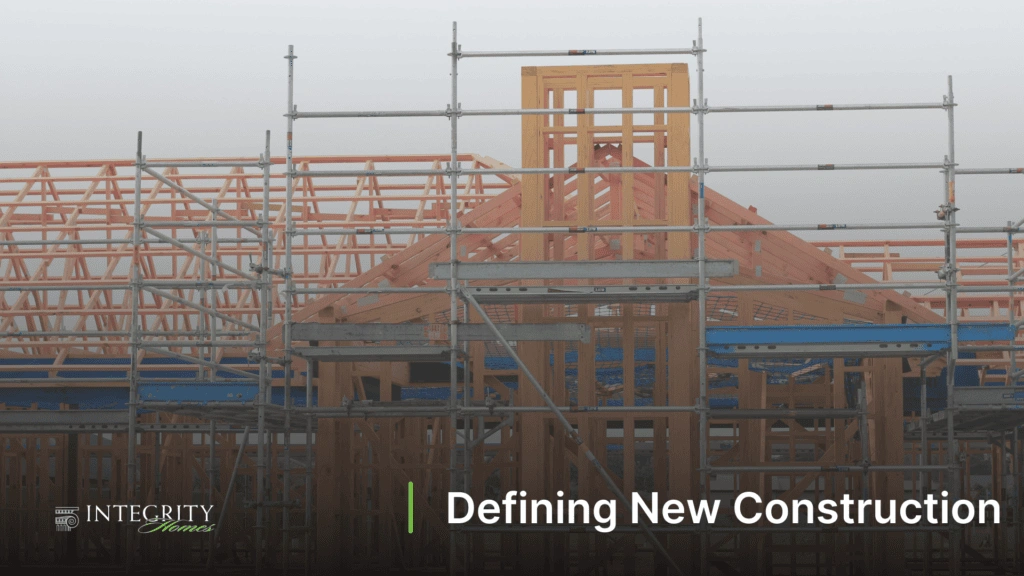
In the realm of residential construction, living in a newly built home has its allure as you would be the first resident. New construction homes can vary widely, from custom homes tailored to individual preferences to spec homes that are move-in ready without prior buyer customization requests, or tract homes with uniform design within a development. Each type provides different levels of personalization options during the building process.
Properties known as custom homes are designed exclusively to meet the buyer’s specific needs and desires. The buyer is in complete control of every aspect of the construction process, resulting in a residence that includes special features such as built-ins tailored to their preferences. Custom homes are often fitted with luxurious, cutting-edge appliances that elevate both their utility and market value.
In contrast, there are various other categories of new construction homes:
Ultimately, when selecting a home from new construction options available, whether it’s a mass-produced tract home or a custom-built residence, the decision rests squarely on what you prioritize personally in terms of design choices and functional requirements.
When weighing the merits of new construction homes against those of existing home options, there are distinct advantages to consider. New construction homes, being less than a year old and never inhabited, offer the pristine appeal that many buyers want in a brand-new house.
In terms of design, construction homes often feature modern layouts with spacious living spaces, abundant windows, and ample storage options. This is a stark contrast to the older floor plans typically found in existing houses. Choosing a new house usually means expecting larger square footage, more natural light from expansive windows, and improved storage solutions within your living space.
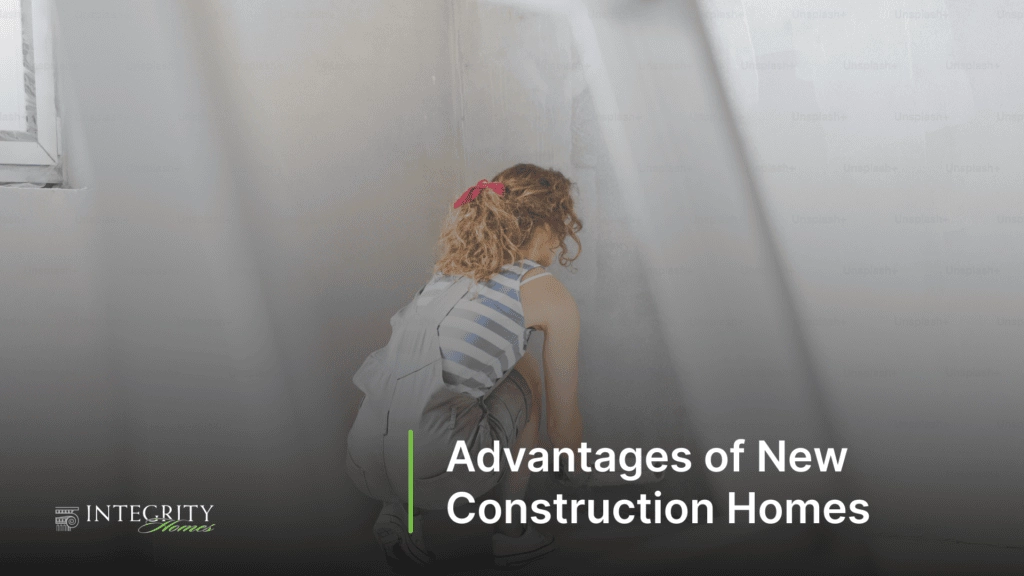
There are numerous compelling reasons to consider investing in new construction homes. A primary benefit of these homes is their readiness for immediate occupancy. Given that everything from the appliances to the plumbing is brand new, you can forget about dealing with any maintenance issues or deteriorating parts demanding immediate attention. New constructions also comply with the latest building codes and safety regulations.
Another advantage is the luxury of tailoring a new construction home to suit your tastes without having to undertake renovations right off the bat. These homes come complete with modern designs and floor plans as well as sought-after features such as pools, clubhouses, and nature trails.
A standout feature of new construction houses is their enhanced energy efficiency through:
Let’s delve deeper into these advantages.
The allure of new construction homes extends to the array of customization options they offer. Collaborating with a builder lets you tailor your new home so that it reflects your personal style, needs, and lifestyle. Among the customizable features available are:
This level of flexibility gives you complete creative control over how you want your newly constructed home to look and feel.
Beyond aesthetics, constructing a new home provides an excellent opportunity to integrate state-of-the-art smart technology into its design. This can include advanced systems like Wi-Fi-connected thermostats, smart lighting solutions, and comprehensive security networks—all adding layers of functionality and safety that benefit any homeowner in today’s high-tech era.
One key feature of new construction homes is their energy efficiency. They are built using eco-friendly building materials and advanced construction practices to enhance energy efficiency. Some features of energy-efficient new homes include:
These features contribute to reduced energy consumption and enhanced air quality in new homes.
Improved insulation techniques and the installation of airtight, energy-efficient windows are crucial for maintaining a comfortable indoor temperature and minimizing air leakage. Moreover, the integration of smart home technology, such as programmable thermostats and natural lighting solutions, aids in energy management and further reduces the energy footprint of new constructions.
Thanks to these features and technologies, new construction homes often lead to significantly lower utility bills compared to older homes.
New construction homes offer significant benefits when it comes to upkeep. Because they are equipped with brand-new appliances, roofs, and foundations, these newly constructed houses usually don’t need repairs right away.
To ensure proper maintenance in these homes:
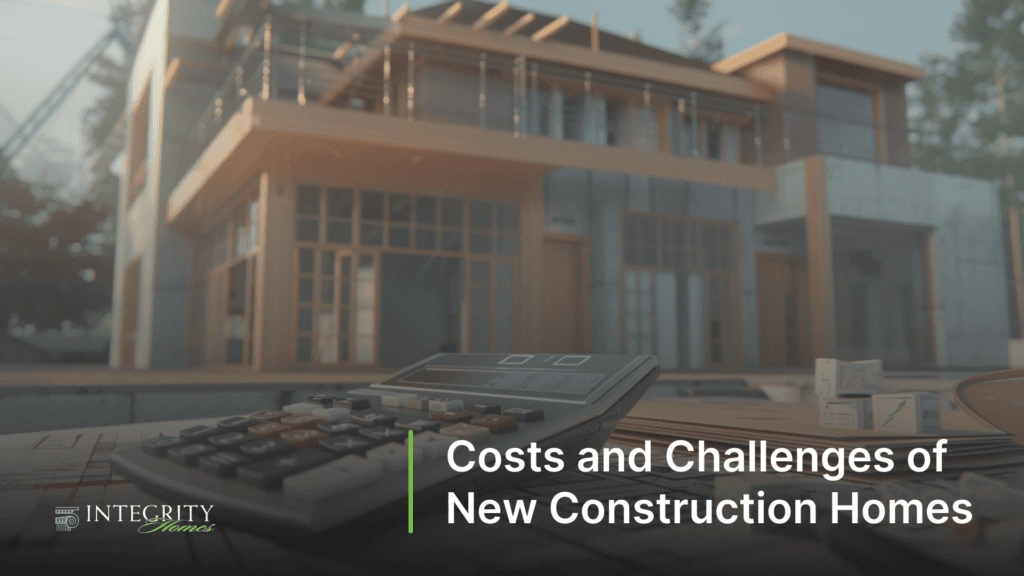
Although new construction homes come with a host of advantages, they also present certain challenges. The primary issue for many is the higher initial price tag. Another challenge is the longer wait time to move into a newly constructed house compared to an existing home. Negotiating the price for a new construction home is also less flexible compared to existing homes. This can limit buyers’ ability to lower the final cost. Let’s delve deeper into these issues while also considering how median sales prices influence cost expectations regarding newly built residential properties.
Newly constructed homes typically come with higher upfront expenses. These homes are more expensive than existing houses right from the start since they don’t require renovations or updates. If buyers opt to customize their homes with additional features during the building process, this can lead to an increase in total costs associated with purchasing a new construction. To avoid surprises during the construction process, a thorough and well-planned budget that accounts for all potential expenditures is essential.
When taking out a construction loan for these properties, the down payment typically falls between 5% and 10% of the total cost, which is usually more than what’s needed for pre-owned homes. Property taxes might also be steeper for new construction due to their fresh-on-the-market status, increasing their assessed value.
Building a new construction home is an extensive process. Typically it takes anywhere between seven and twelve months to build a new home from scratch. Throughout this year-long journey, homeowners are deeply involved in making creative decisions about the design, materials, and finishes of their future homes. They also oversee the progress of the construction on a daily basis. Delays due to factors such as shortage of materials, inclement weather conditions, or construction challenges could extend this timeline even further.
Individuals considering buying a new construction home often face limitations on their ability to negotiate. Opting for a fixed-price contract can protect buyers from unexpected costs during construction but may limit their flexibility to negotiate. The lengthy timeline for new construction, which can span multiple years from permit application to move-in, weakens buyers’ bargaining power. Therefore, it is crucial to fully understand all terms and requirements before signing any agreement to effectively manage costs throughout the purchase process.
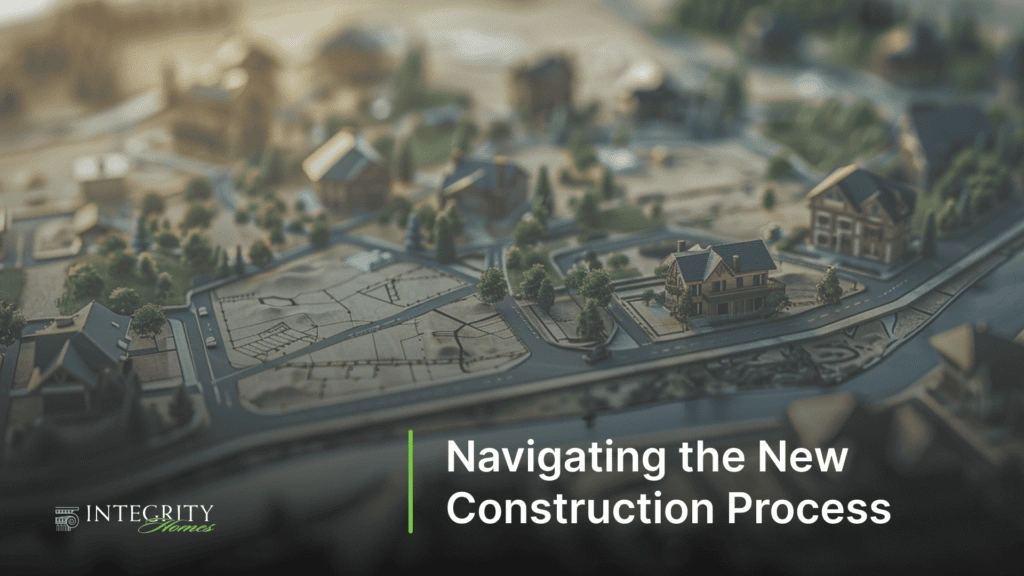
Navigating the new construction home process may seem complex, yet it can be efficiently handled with meticulous planning and expert advice. This sequence of steps leads to the final milestone of closing on your new home.
Choosing a reliable builder is a critical initial move in this journey. It’s important to inquire about their previous projects, evaluate homes they’ve built before, and scrutinize their reputation by exploring online reviews. Next up is securing financing for your new construction home – this involves comparing various lenders based on their standing in the industry, interest rates offered, and quality of customer service.
The support from a seasoned real estate agent throughout this procedure can prove invaluable as they have expertise in:
We will delve into these aspects thoroughly to provide you with an understanding of each stage within the process.
Choosing the right builder is a critical aspect of the new construction process. To select a trustworthy builder, it’s important to perform due diligence by exploring their reputation through online feedback, customer testimonials, and obtaining referrals from reliable sources.
Evaluate the proficiency and experience level of several builders to ensure they possess the necessary skills to tackle diverse construction challenges and are equipped to construct your desired home type. Pay close attention to the quality of materials used by each builder, as well as their workmanship and attention to detail in finishes.
Additionally, it is important to choose a builder who is a clear and transparent communicator, keeping you informed about all aspects of your project and addressing any questions or concerns you may have along the way.
In the process of new construction, obtaining financing is a crucial step. Financing for building a new home comes in the form of construction loans, which are typically high-interest, short-term financial instruments designed to cover the costs associated with building and expected to be paid off within one year.
During the construction phase, borrowers typically make interest-only payments on the amount they’ve drawn from the loan. These rates are higher than traditional mortgage rates because lenders see this phase as riskier.
To successfully apply for a construction loan, an applicant must present evidence of strong creditworthiness including an adequate credit score and debt-to-income ratio along with significant down payment funds. Engaging a licensed builder is imperative. The application also necessitates detailed documentation such as an achievable timeline for completion, a thorough plan of construction activities and processes involved, as well as an appraisal affirming that the proposed value once built will satisfy lending requirements.
Once all planned building activities have been completed or one year has passed since the start date, borrowers may choose to convert their temporary financings into conventional long-term mortgages. This allows for a smooth transition in managing finances after the construction phase, effectively wrapping up the financing phase of the development process. Following the completion of construction, homeownership can then begin.
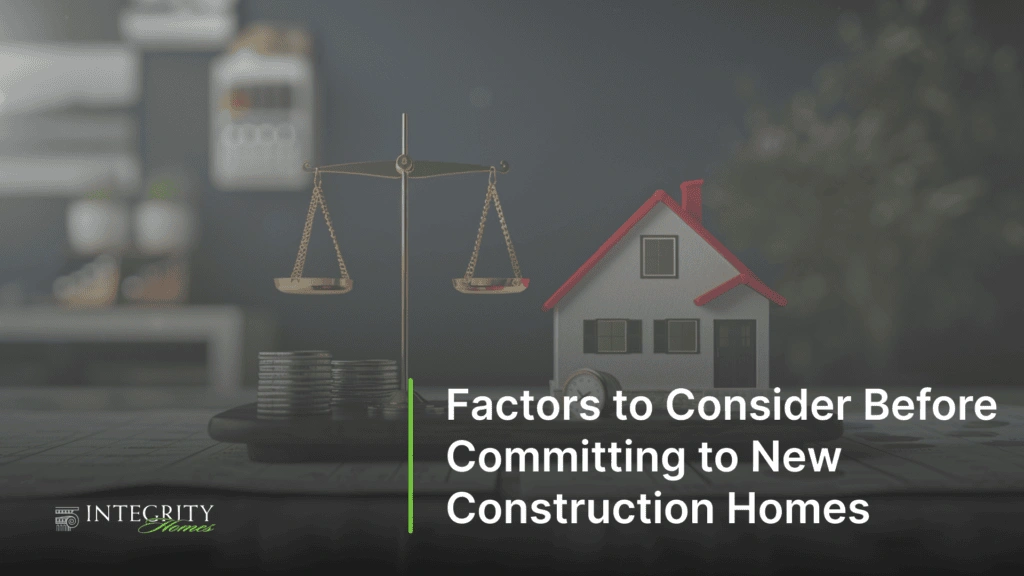
Before initiating the new home construction journey, bear in mind a few key considerations. These include the location and community of your home, its future resale value, understanding builder warranties, and conducting thorough inspections.
The location of your home and the community it is a part of can significantly impact your lifestyle and the value of your home. Additionally, the features and materials you choose for your home can influence its future resale value. Construction homes in suburban areas frequently come with appealing features like clubhouses and swimming pools. However, because of the higher cost of land, these homes are typically located further away. This makes factors such as commute time and access to highways and public transportation important considerations.
It is also crucial to think about how the area may develop in terms of safety and desirability, as this can impact both the future value of the property and the quality of life in the community. Keeping an eye on urban development trends can be helpful when evaluating these aspects.
When planning a new construction home, consider its potential resale value. Some features to consider that can increase the home’s resale value include:
These features can enhance living space and aesthetic appeal, making your home more attractive to potential buyers.
Outdoor amenities that can enhance outdoor living spaces and contribute to the resale value include:
Moreover, the integration of solar panels and other energy-saving materials in new construction can increase a home’s resale value by offering clean, renewable energy and reducing utility bills.
Lastly, it’s crucial to fully understand the builder’s warranty and conduct thorough inspections to ensure the quality of construction.
Understanding warranties provided by builders and carrying out detailed inspections are critical components of the new construction process. Builders of new construction homes typically offer guarantees that cover essential aspects like plumbing, electrical setups, and structural soundness for durations ranging from one to ten years.
It is advisable to arrange an inspection for your new construction home once the builder declares completion but before conducting a final walkthrough. This proactive measure helps in spotting any problems early on so they can be rectified promptly. It’s prudent to examine your home’s warranty before reaching the first year mark of living there as this will aid in addressing any issues related to workmanship or materials with the builder under the protection of said warranty.
In conclusion, new construction homes offer a host of benefits. The chance to customize your home, the promise of energy efficiency, and lower maintenance requirements make new construction an attractive choice. However, these advantages come with challenges such as higher initial costs, longer timelines, and limited negotiating power.
Navigating the new construction process may seem daunting, but with careful planning and proper guidance, it’s a journey worth undertaking. After all, there is nothing quite like the satisfaction of stepping into a brand-new house and knowing it’s entirely yours, from the ground up.
Buying a new construction home comes with its challenges. Some common pitfalls to watch out for include unrealistic timelines, unexpected costs, overlooking builder reputation, and not understanding the warranty terms.
While builders may have less room for negotiation compared to individual sellers, it’s still possible to negotiate on certain aspects such as upgrades, closing costs, or financing terms. Understanding the market and being prepared to negotiate can potentially save you money.
Custom homes are built to the buyer’s specifications, offering full control over design and features. On the other hand, spec homes are already built or under construction by the builder, limiting customization options but providing a quicker move-in process.
Researching builders is crucial to ensure a smooth home-building experience. Look for reviews, check past projects, visit model homes, and ask for recommendations from homeowners who have worked with the builder to gauge their reputation and quality of work.
Staying informed about the latest trends in home design can help you make decisions that enhance the aesthetic appeal and functionality of your new home. From open floor plans and smart home technology to sustainable materials and energy-efficient features, understanding current trends can inspire your choices.
Maryland | Frederick, MD | National Harbor, MD | Potomac, MD
Virginia | Alexandria, VA | Fairfax, VA | Lorton, VA | Northern, VA | Stafford, VA | Stephenson, VA | Winchester, VA | Washington DC